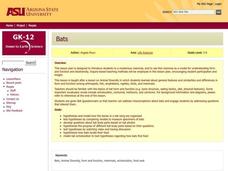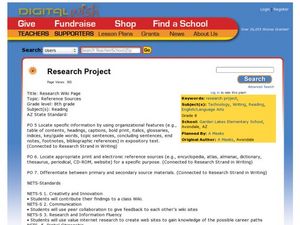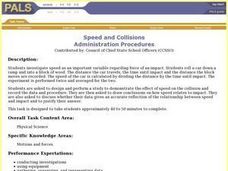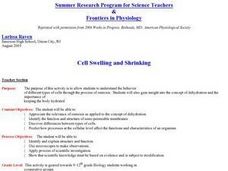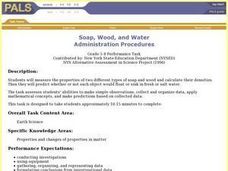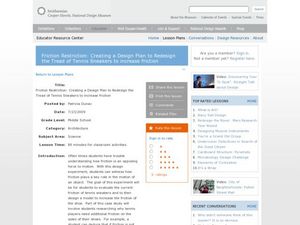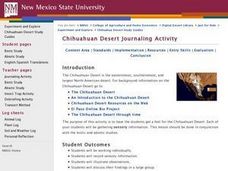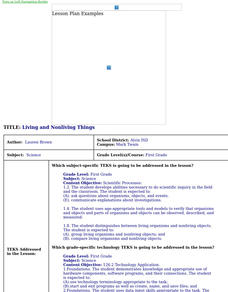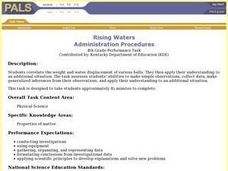Curated OER
Bats
Students model how the bones in a bat wing are organized. They develop questions about bat body parts based on photographs. They hypothesize how bats locate their food.
Curated OER
Density of Minerals
Students determine the mass, volume, and density of two different mineral samples. Students show data and calculations as well as answer questions about the mineral identities.
Curated OER
Research Project
Young scholars learn the characteristics of arachnids by researching the arachnid of their choice and producing a 4 to 5 paragraph research paper.
Curated OER
Speed and Collisions Administration Procedures
Young scholars investigate speed as an important variable regarding force of an impact. Students roll a car down a ramp and into a block of wood. The distance the car travels, the time until impact and the distance the block moves are...
Curated OER
Aerospace
Learners experiment with weight and balance of a glider. In this flight instructional activity students construct their own flying glider and record their experiment with it.
Curated OER
Biofilms Are Everywhere
Students research biofilms and create brochures. They role play as advertising firm members assigned to educate the general public about biofilms. They create "wanted dead or alive" posters about harmful and helpful biofilms respectively.
Curated OER
Microbes: Too Smart for Antibiotics?
Students examine how germs spread from one person or object to another. They discuss antibiotic resistant bacteris and examine the benefits of microorganisms. They explore methods of curbing antibiotic resistance.
Curated OER
The Cantankerous Pathogen
High schoolers explore what factors influence the spread of infectious diseases. They explain how human manipulation of the environment affects the transmission of diseases.
Curated OER
Will Biotech Crops Solve World Problems?
Pupils read an online article to examine what biotechnology and agricultural biotechnology are. They answer questions and complete worksheets based on the article's information.
Curated OER
Click, Clack, Moo: Electric Blanket Science
Students read Click, Clack, Moo: Cows That Type by Doreen Cronin and discuss the similarities and differences between electric blankets and regular blankets. They brainstorm a list of reasons why the farm animals wanted electric blankets.
Curated OER
Cell Swelling and Shrinking
Students examine the concept of osmosis in relation to dehydration. They identify the function and structure of semi-permable membranes. They predict how certain processes can affect the characteristics of an organism.
Curated OER
Swingers
Students investigate the motion of a swinging pendulum. They experiment with a pendulum to find out why it might swing at different speeds at different times.
Curated OER
Magnifiers
Students describe how several different objects magnify a provided sentence and decide if they are good magnifiers or not. They then write a sentence describing two properties an object must have in order to be a good magnifier.
Curated OER
Interdisciplinary Task: Weather
Students design a chart to use to record the weather for five days. They then build an anemometer to record wind speed and discover why they are used for this purpose.
Curated OER
Rolling Down Hill
Students perform an experiment, collect, and analyze data of a rolling marble down a ramp. They report results after they complete their experiment. Students are assessed in science and writing.
Curated OER
Temperature and Enzymes
Students compare the times it takes the milk in each of two cups to curdle. They are told that an enzyme that is added to the milk, rennin, is involved in the natural curdling process of milk. Students are asked to consider what...
Curated OER
Soap, Wood, and Water
Students measure the properties of two different types of soap and wood and calculate their densities. Then they predict whether or not whether or not each object would float or sink in fresh or salt water.
Curated OER
Using a Thermometer
First graders use their senses to formulate questions and make predictions to determine what is in the "Wonder Bag". They hold pieces of ice and examine while listing descriptors on a chart and then take their own temperature using an...
Curated OER
Friction Restriction: Creating a Design Plan to Redesign the Tread of Tennis Sneakers to Increase Friction
Students evaluate the friction of tennis sneakers and redesign them to increase friction. In this physics lesson, students calculate starting, sideways and forward stopping friction. Using quantitative data, they prove that redesigning...
Curated OER
Chihauhan Desert Journaling Activity
Students explore U.S. geography by completing an observational activity with classmates. In this New Mexico lesson, students research the Chihuahuan Desert by visiting several Internet sites. Students write the data they've collected in...
Curated OER
Living and Nonliving Things
First graders distinguish between living and nonliving objects, and compare living organisms and nonliving objects.
Curated OER
Floating Pencil
Students discover how salt water makes a pencil float better than freshwater by measuring and comparing the lengths of the portion of the pencil that floats above the water surface. They then determine if an unknown water sample is...
Curated OER
Rising Waters
Fourth graders rank balls by size from smallest to largest and from lightest to heaviest and then by how much they made the water rise. They then discuss why certain balls make the water rise higher than do other balls.
Curated OER
Colored Dots 1
Students observe that colored markers are a mixture of many different colors by performing a chromatography experiment. They make observations, record information, and make generalized inferences from their observations.


